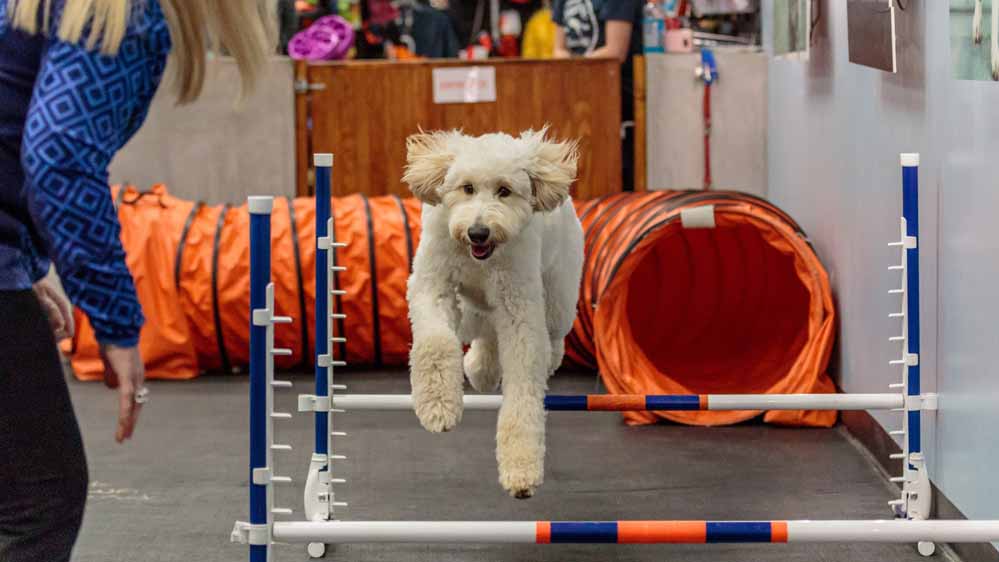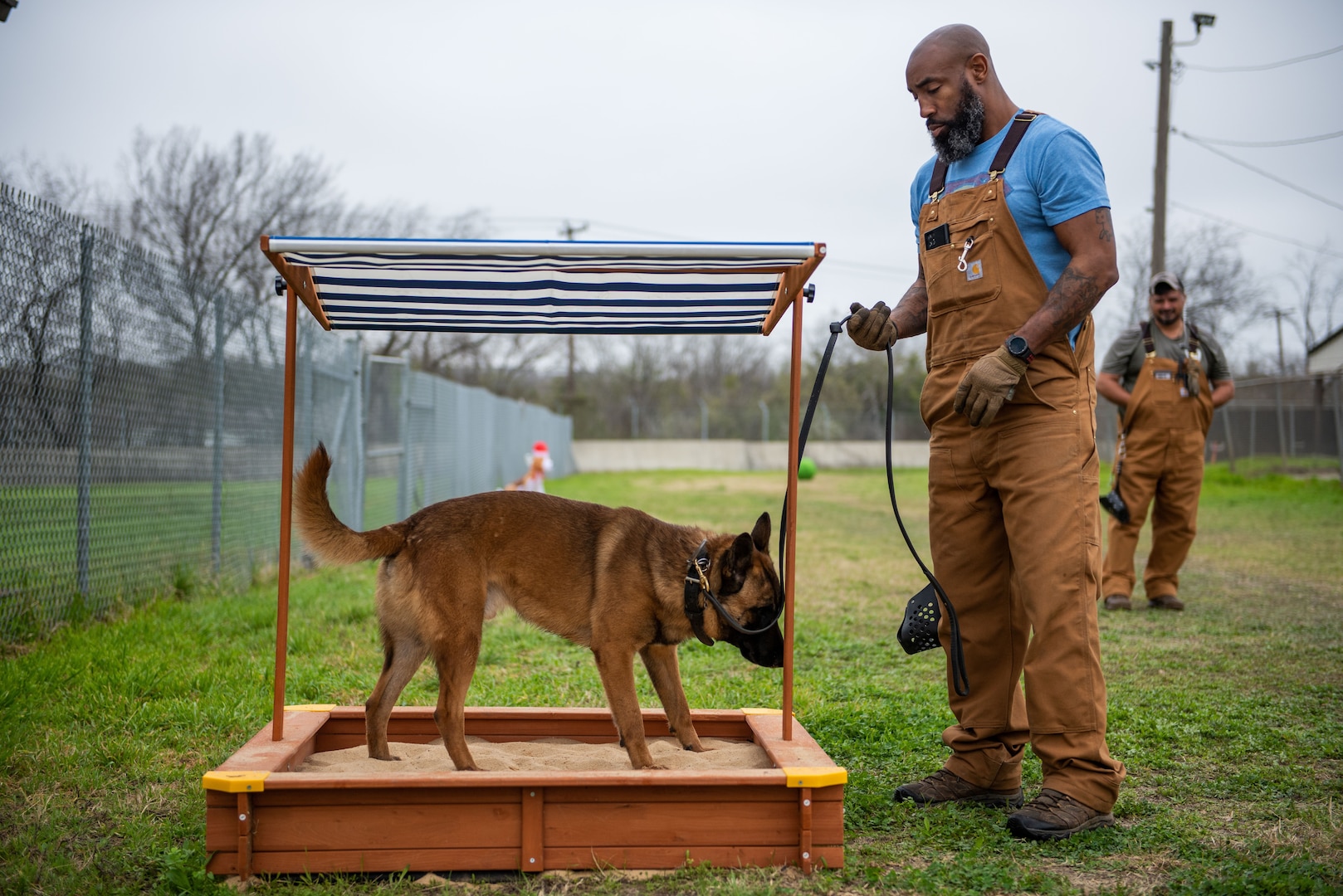Check Out the Various Kinds of Pet Dog Training Available for Your Furry Pal
Comprehending the various kinds of pet training is vital for boosting your canine friend's habits and promoting a stronger bond. From standard obedience to innovative methods such as agility and scent work, each training method supplies unique advantages customized to both the dog's and proprietor's requirements.
Fundamental Obedience Training
Fundamental obedience training lays the structure for a mannerly pet dog, setting the phase for a harmonious relationship in between animal and owner. This important training concentrates on teaching dogs fundamental commands such as rest, stay, come, down, and heel. These commands not just enhance communication however likewise promote safety in numerous environments.
The training procedure generally begins with positive reinforcement methods, where incentives such as treats or praise are used when the pet dog successfully complies with a command. This strategy encourages a favorable discovering atmosphere, ultimately promoting depend on between the owner and the pet dog. Uniformity is essential; regular technique ensures that the canine keeps commands with time.
Furthermore, fundamental obedience training aids to address common behavior problems, such as jumping, barking, or drawing on the chain. By developing clear boundaries and assumptions, proprietors can minimize undesirable actions and enhance their dog's socialization abilities.

Advanced Training Techniques
Advanced training techniques build on the foundational abilities developed in fundamental obedience training, supplying a pathway to improve a pet dog's capacities and responsiveness. These techniques commonly involve specialized abilities and commands, enabling pet dogs to execute tasks that need greater degrees of concentration and knowledge.
One preferred method is agility training, where canines browse barrier courses, enhancing their physical coordination and mental sharpness. This not just gives workout but also strengthens the bond in between dog and handler via teamwork and communication.
One more sophisticated method is scent job, which faucets right into a dog's all-natural olfactory abilities. This training encourages dogs to identify and situate particular scents, enhancing their focus and problem-solving skills. Such tasks can be specifically advantageous for types predisposed to tracking.
Service pet dog training is another important area, where canines learn to help people with handicaps. This training calls for a high level of obedience and specialized abilities customized to the particular demands of their trainers.
Therapy Approaches
Effective pet dog training prolongs past showing skills and commands; it likewise encompasses therapy methods that address unwanted behaviors. These strategies are essential for correcting problems such as aggressiveness, extreme barking, and splitting up stress and anxiety, ensuring an unified connection between pets and their proprietors.
One commonly identified technique declares recommended you read support, which includes gratifying desired habits to encourage their recurrence. This approach works in strengthening good routines while minimizing concern or stress and anxiety in the pet. On the other hand, aversive strategies, such as punishment or adverse support, are usually dissuaded by professionals as a result of their prospective to produce fear and anxiety, causing more behavioral problems.
An additional important method is desensitization, which slowly subjects pets to the stimulations that provoke unfavorable habits in a regulated manner. This process assists pet dogs learn to continue to be tranquil and composed in scenarios that would normally cause anxiety or aggression.
Counter-conditioning is commonly utilized in combination with desensitization, where the canine discovers to connect positive experiences with previously negative stimuli. Both methods call for perseverance and consistency, making them efficient devices for attaining lasting behavioral change. By utilizing these habits adjustment approaches, animal proprietors can cultivate a well-adjusted and happy canine buddy.
Specialized Training Programs
In the world of dog training, specialized training programs accommodate certain demands and objectives, using tailored methods that enhance a dog's capacities and address special difficulties. These programs are created for various purposes, consisting of service dog training, therapy dog prep work, and even competitive sports training.
Solution pet dog training concentrates on outfitting pet dogs with the skills necessary to assist people with disabilities, such as guiding visually impaired proprietors or signaling to medical emergencies. This training is strenuous and commonly requires a mix of obedience, socialization, and details task-oriented skills.
Therapy pet programs aim to prepare pet dogs for emotional support duties in healthcare facilities, schools, and nursing homes. These pets have to exhibit calmness, sociability, and a mild disposition, guaranteeing they can provide comfort to those in distress.
Additionally, competitive sporting activities training, such as agility or obedience trials, highlights fitness, accuracy, and teamwork between the dog and trainer. These programs demand a high level of commitment and technique, promoting a solid bond while refining the pet dog's sports capabilities.
Fun and Interactive Training Activities
Exactly how can pet dog training be both pleasurable and efficient? The solution lies in integrating enjoyable and interactive training tasks that stimulate your pet dog's mind while strengthening check that essential skills. Engaging your pet via play not just reinforces the bond between you and your fuzzy friend but also improves their understanding experience.
One effective way to achieve this is with dexterity training, where pets browse barrier programs that challenge their physical and mental capacities. This activity encourages problem-solving and boosts coordination, making it an outstanding option for active types. An additional alternative is making use of challenge playthings that give treats, which can keep your dog psychologically inspired and engaged to discover.
Furthermore, integrating games like bring or hide-and-seek can make training sessions more dynamic. These activities urge the pet dog to reply to commands in a fun context, advertising obedience while enabling social interaction.

Final Thought
In final thought, numerous sorts of canine training are important for enhancing canine behavior and promoting a solid human-animal bond. Standard obedience works as the structure, while advanced strategies, habits alteration, and customized programs resolve details requirements. Involving tasks better enrich the training experience, their explanation making sure that it remains beneficial and pleasurable for both pets and their trainers. Discovering these varied training options gears up canine owners with the tools needed to cultivate well-shaped, happy, and obedient buddies.
Comprehending the various kinds of dog training is important for enhancing your canine friend's behavior and fostering a more powerful bond. From standard obedience to sophisticated methods such as dexterity and scent job, each training technique uses one-of-a-kind advantages tailored to both the pet's and owner's demands.Basic obedience training lays the structure for a well-behaved canine, establishing the stage for a harmonious relationship in between pet and owner.The training procedure typically starts with positive reinforcement strategies, where rewards such as deals with or appreciation are used when the canine efficiently adheres to a command.In conclusion, different kinds of canine training are important for boosting canine actions and fostering a solid human-animal bond.